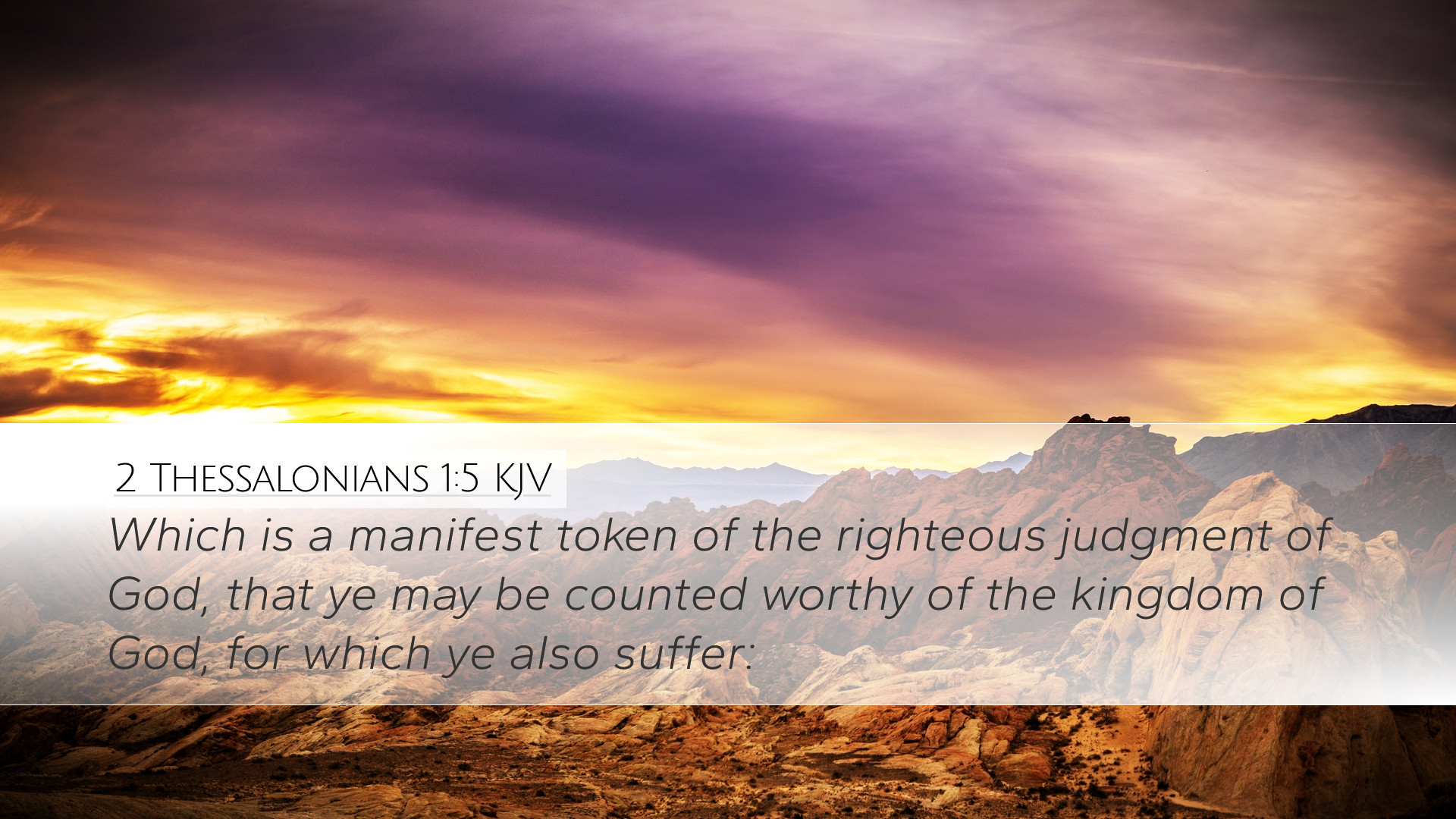Old Testament
Genesis Exodus Leviticus Numbers Deuteronomy Joshua Judges Ruth 1 Samuel 2 Samuel 1 Kings 2 Kings 1 Chronicles 2 Chronicles Ezra Nehemiah Esther Job Psalms Proverbs Ecclesiastes Song of Solomon Isaiah Jeremiah Lamentations Ezekiel Daniel Hosea Joel Amos Obadiah Jonah Micah Nahum Habakkuk Zephaniah Haggai Zechariah Malachi2 Thessalonians 1:5
2 Thessalonians 1:5 KJV
Which is a manifest token of the righteous judgment of God, that ye may be counted worthy of the kingdom of God, for which ye also suffer:
2 Thessalonians 1:5 Bible Commentary
Commentary on 2 Thessalonians 1:5
Verse Reference: 2 Thessalonians 1:5 - "This is evidence of the righteous judgment of God, that you may be considered worthy of the kingdom of God, for which you are also suffering."
Introduction
In this verse, the Apostle Paul writes to the Thessalonian church, commending their perseverance in the face of persecution. He emphasizes the concept of suffering as a means of validation of their worthiness for God's kingdom. Through the lens of various public domain commentaries, we will delve into the theological significance of this verse, highlighting its implications for believers, its eschatological contexts, and its implications for the character of God as just and righteous.
The Context of Suffering
Paul's words serve as a reminder to the Thessalonians that their current afflictions are not meaningless. As Matthew Henry notes, "The troubles of good men are a trial of their faith and patience, and through it, God confirms their worthiness." It is through suffering that believers are tested, and their steadfastness reflects their commitment to the gospel. This sentiment echoes the teaching found in Romans 5:3–4, where suffering produces perseverance, character, and hope.
Evidence of Righteous Judgment
Paul connects the trials faced by the believers with "the righteous judgment of God." Albert Barnes expresses that this phrase indicates that the afflictions they endure are a divine acknowledgement of their faithfulness. He asserts that suffering for Christ is not a sign of abandonment but a mark of divine approval. The righteousness of God's judgment is portrayed throughout scripture as being both just and transformative, reflecting His holy nature.
Worthy of the Kingdom
The phrase "considered worthy of the kingdom of God" reveals the nature of divine grace intertwined with human experience. Adam Clarke contributes to this discussion by asserting that worthiness stems from God's grace manifest in the lives of believers. He argues that it is through enduring hardship that believers demonstrate their allegiance to Christ and exemplify the values of the kingdom. Thus, their suffering becomes a gateway to a deeper understanding of the gospel.
Theological Implications
This verse raises essential questions about the nature of God's justice and the role of suffering in the believer's life. 1. The Assurance of God's Justice: The assurance that God’s judgment is righteous underpins the entire argument. Henry elaborates that while the world may perceive the suffering of Christians as a sign of divine disfavor, it paradoxically affirms their status as heirs of the kingdom. 2. Endurance as a Test of Faith: The hardships faced are not arbitrary; they are divinely ordained as a means to cultivate endurance and fortitude.
Exhortation to the Faithful
Paul's exhortation serves both to comfort and to encourage the Thessalonian church. Barnes points out that amidst trials, believers are reminded of their ultimate hope in the eschatological promise of God. They are called to remain steadfast, knowing that their present sufferings contribute to their future reward. The reality of suffering is a shared aspect of the Christian experience, uniting believers in their collective testimony of faith.
Conclusion
In conclusion, 2 Thessalonians 1:5 offers profound insights into the nature of suffering, divine justice, and the believer's identity in Christ. As we reflect on this Scripture, let us remember:
- The significance of endurance through trials as a reflection of our faith.
- The assurance that God’s judgment is righteous and aims at our ultimate good.
- The calling to view our hardships through the lens of God’s heavenly kingdom.
May this understanding encourage believers to embrace their suffering, knowing that it produces a weight of glory (2 Corinthians 4:17) and prepares them for their inheritance in God's eternal kingdom.


